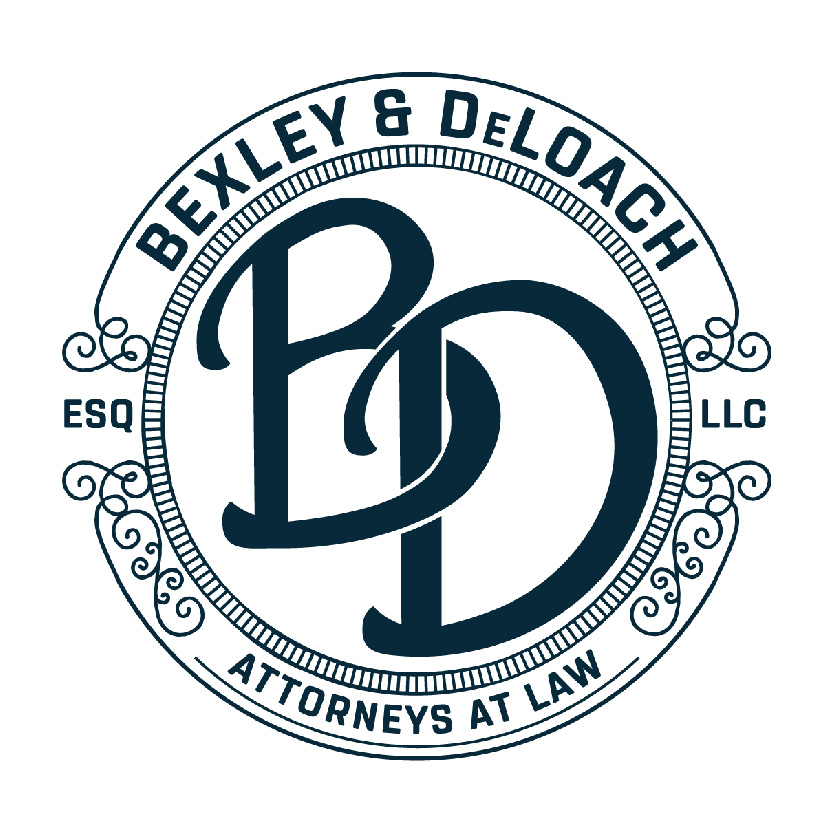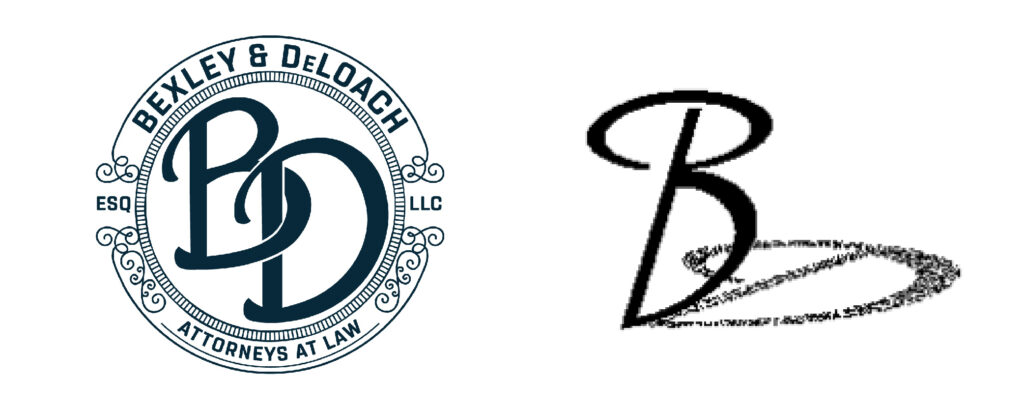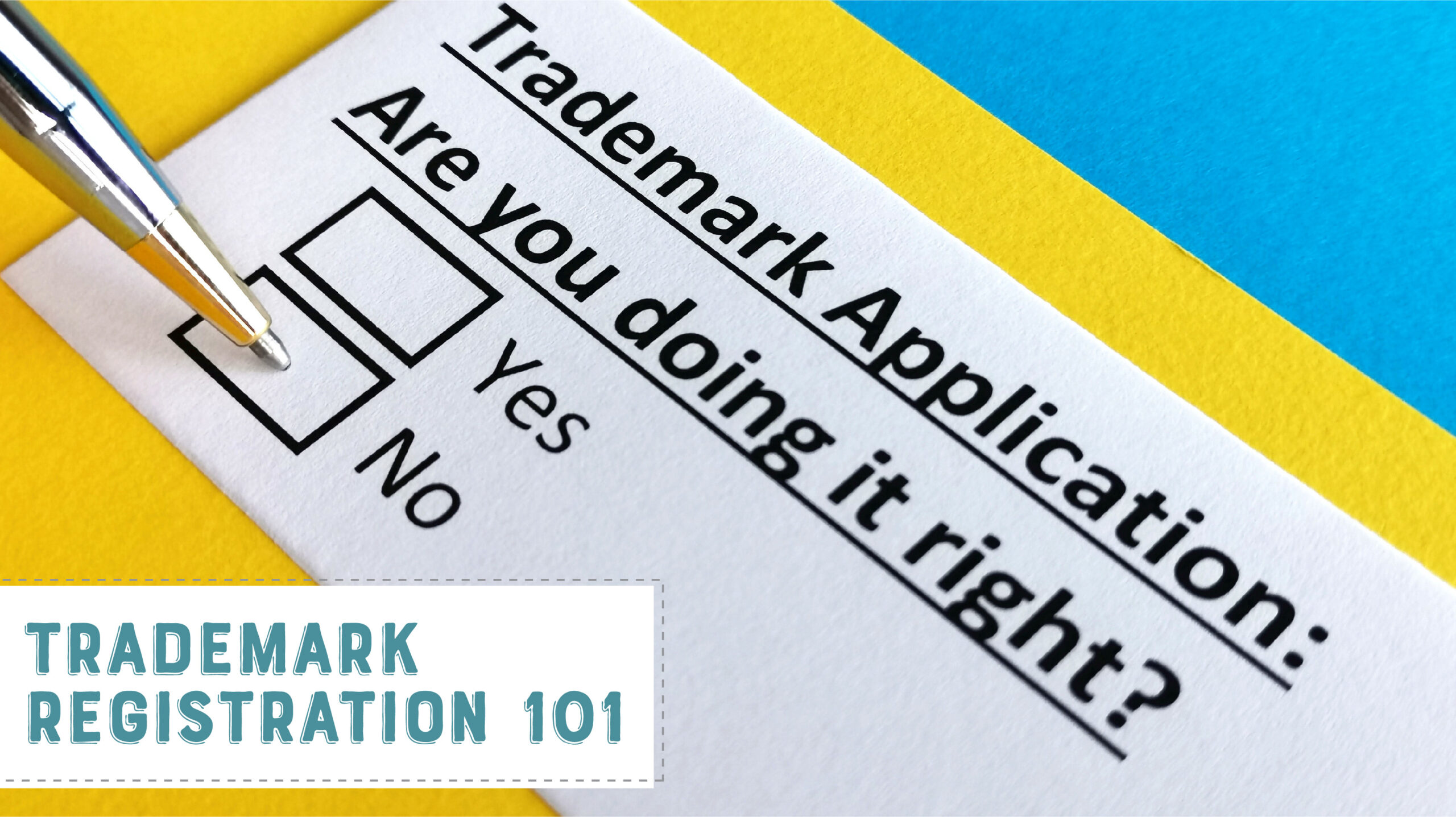A large part of what we do at Rock Paper Scissors is develop logos and brands for our clients, and a question that inevitably comes up is “Should we trademark our logo?” The answer is: It depends AND you should talk to a trademark attorney. To make this process easier, we recently brought in our trademark attorney Robert Bexley of Bexley & DeLoach, LLC to talk through the process.

To help set the stage for the conversation, Robert talked through the creation of his firm’s logo with the RPS team and the process of trademarking it. Our team took time to get to know Robert’s team, business, and culture, we worked through several concepts and before landing on a logo design that the Bexley & DeLoach team fell in love with immediately. The logo is reminiscent of a notary seal with a large B and D in the center along with some flourishes that the Bexley & DeLoach team felt were a very accurate representation of their brand. After the logo was finalized, Robert’s team set off to trademark the new logo they were so proud of to protect their brand’s image in the public sphere.
When Robert began the process of trademarking the logo and following all the necessary steps to file for the trademark, he received a rejection letter known as an office action. This letter said that the logo was “substantially similar” to another registered logo for a law firm in Massachusetts. While the two logos only share the B and D letters in common, the fonts are clearly different and the main problem was that the other logo was for another law firm which was the reason for the rejection.

Robert initiated the appeal process with the United States Patent and Trademark Office (USPTO) and was able to make contact with one of the other law firm’s managing partners who agreed to tell the USPTO that there was no conflict with the two logos. The other law firm told Robert they were actually using a different logo and canceled the trademark with the old logo, which paved the way for the Bexley & DeLoach team to move forward with trademarking their new logo.
Robert’s experience brings up an important point of consideration because businesses and organizations can, and have, received cease and desist letters as well as lawsuits for infringement before when it comes to their logos. His team experienced the same things some of his clients face daily, providing his team with even more insight to be able to share with their clients from first-hand experience the importance of when to consider trademarking and what that process is like, and why having an attorney by your side is important. Let’s take a look at some of the common questions.
When should you consider getting a trademark?
A trademark is exclusively a marketing concept (the name, slogan, and logo) that represent a company, its goods and services, and the origins from where those things come from. Take Nike for example. You have the name (Nike), the “Just do it” slogan, and the swoosh logo, and any time you see any of those three things, you immediately recognize the brand, its products, and perhaps even the athletes that represent the brand. Logos play a huge role in a brand because humans are very visual and start to connect what they see with a business’s products or services, goodwill, and expertise that come along with it.
A business should trademark when they have established a level of goodwill that they want to protect at a national or international level, especially if they are in a market prone to confusion or a lot of internet competition. A local mechanic may not need to trademark as much as a restaurant or an online business. Other factors that can play into whether you need to go ahead and trademark now or can wait a little longer include:
| Do You Need to Trademark? | Yes | No |
| You are a start-up | • | |
| You are based locally with little competition | • | |
You are established and are starting to scale up | • | |
You’ve paid good money for a very distinct and recognizable logo | • | |
You have a very distinct and recognizable trade name | • |
At the very least, it’s worth having a consultation with a trademark attorney to find out if this is worth pursuing right now. Trademarking is all about protecting your investment, so if you spend a lot of money on a logo you are proud of, it’s a measure of protecting your brand.
Also, keep in mind that trademark registration adds to your organization’s intellectual property. This is important because if you were to ever consider selling your business or even merging with another, showing that registration adds to your intellectual property portfolio and assets. While it may not be easily quantifiable, it definitely adds a sense of legitimacy to your business.
Do I really need to register with the USPTO? Can I do a state-level trademark instead?
Some states, such as Georgia, offer state-level trademarking but this is a decision best to be made with your trademark attorney as it may not always make sense or be worth the money. Remember that in today’s digital world, if you have an online presence your business or organization can essentially be considered national or international, even if you only serve the local community, so national trademark registration is worth talking about. This is why it is crucial to know your business and your vision so you can protect it from another similar business trying to piggyback off of the goodwill you’ve established and all the hard work that went into it. Again, this type of trademark registration is a discussion you should have with your attorney who knows and has experience with the process.
What is the difference between the symbols?

The © means copyright and in the past, if this symbol wasn’t shown it meant your work wasn’t copyrightable. The ™ means that you are in the process of trademarking the piece it is shown with or are at least letting the world know that you have a common law trademark. The Ⓡ indicates that your trademark is actually registered–you have a registration number, you’ve gone through the process, you can look up the trademarked item on the USPTO, and you are permitted to put the symbol next to your trademarked work. None of these symbols are actually required, and often people choose not to use them with their logos as it can affect the entire look and feel of the logo. However, the USPTO will want to know the first time it ever came into existence and the first time you used your logo in commerce when you are registering it.
How long does a trademark registration last?
Theoretically, forever. You have to re-register every five years for the first 10 years, and then every 10 years after for the rest of existence. If you make any changes, you start the entire process over again. The USPTO keeps a record of this and with many older companies, such as Coca-Cola or McDonald’s, you will see decades’ worth of trademarks and the evolution of their logos and other trademarked assets. Typically, companies such as these will either keep a logo “live” so others can’t use them or they will let them “die” meaning that the logo is fair game if someone else wants to use it.
What is the process for trademarking a logo or other assets?
In Robert’s experience, the process of trademarking has taken a little as four months to as long as two-and-a-half years and likens the process to a marathon rather than a sprint race. Robert’s team begins with a consultation to review the type of trademark that you want (ex: name, logo, or slogan) and determine right off the bat whether or not it can be trademarked. From there, the process involves:
- A trademark search through the USPTO website, internet searches, and other software and resources that help detect exact and/or similar matches;
- This research is then put into the trademark application, which takes about a week to upload into the USPTO system;
- Next, the waiting game begins before the application is assigned to an examining attorney. Once assigned, the examining attorney will review the application, which can take as long as a month.
- After the examining attorney’s review, the application is put into the Trademark Gazette, a public online document that provides others the opportunity to dispute and challenge it for 30 days;
- If no one has challenged the trademark, you have about another 30 days before you receive your certificate in the mail.
If the examining attorney finds a problem, you’ll receive an office action that explains the concern or problem at hand. You have about six months to fix it and send the changes back in. It can take some time to get a response from the examining attorney and the process can continue for a while before the examining attorney closes the case, but your trademark attorney can appeal the decision. Going before the appeals board can take about two to two-and-a-half years start to finish. If you receive a rejection from the appeals board, you can take the case to a federal court, which will likely take one to two years.
Doing the trademark search is a key step in avoiding the issues that can land you submitting an appeal, so it’s worth working with someone who knows the trademark search process well as that will save you time, money, and several headaches.
Wrapping it all up
When it comes to trademarking any of your brand assets, the old saying is true: An ounce of prevention is worth a pound of cure! If you’re even thinking about trademarking a logo, slogan, or name, it’s in your best interest to speak with someone who knows the process and can give you advice that is in your best interest, like Bexley & DeLoach! If you would like us to introduce you to Robert and his team, email help@123shoot.com to ask for an introduction.


